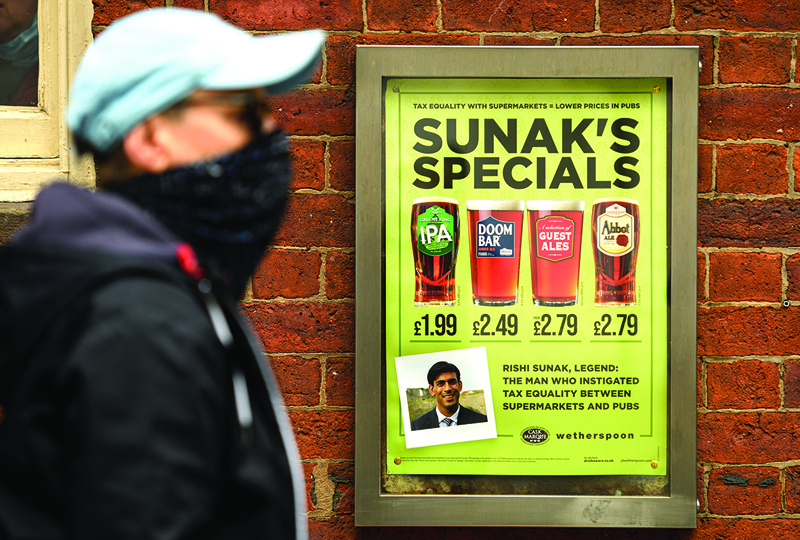
LONDON: The British government on Friday said it would pay up to two-thirds of staff monthly wages to firms forced to close over the winter months, as infection rates skyrocket. Finance minister Rishi Sunak extended a scheme launched just two weeks ago for workers taking reduced hours to help businesses required to shut as part of efforts to cut transmission rates.
More than 42,000 people have died in the outbreak in Britain-the worst toll in Europe-and concern is mounting about a potentially deadlier second wave, and its social and economic impact. The UK economy grew by a weaker-than-expected 2.1 percent in August and remained far down on pre-pandemic levels, official data showed Friday.
It shrank by a fifth in the second quarter, entering recession on the back of a full lockdown that was only eased in June. Under the extended scheme, businesses will receive grants to pay the wages of staff who cannot work, with the government paying two-thirds of each employee's monthly salary up to a maximum of £2,100 ($2,715, 2,309 euros) per month each.
Their employers will pay national insurance and pension contributions but will not be asked to contribute towards wages, unlike other firms using the scheme. "Throughout this crisis my priority has always been to protect jobs, so today I'm announcing an expansion of our jobs support scheme, specifically to protect those jobs of people who work in businesses who may be asked to close," Sunak told reporters. "If that happens those workers will receive two-thirds of their wages for the time that they're unable to go to work."
'Safety net'
"I hope this provides reassurance and a safety net for people and businesses in advance of what may be a difficult winter," Sunak added. A Treasury source estimated that the expanded scheme would cost "hundreds of millions" of pounds a month. From November, the government will nevertheless water down its nationwide jobs support that has helped keep millions of people in employment during the pandemic. Many analysts fear this will lead to a surge in unemployment, with the hospitality sector particularly affected.
Sunak denied Friday that his latest enlarged scheme would replicate the so-called furlough plan, which ends in late October. "This is a very different scheme to what we've had before. This is not a universal approach," he told reporters. "This is an expansion of the jobs support scheme specifically for those people who are in businesses that will be formally or legally asked to close so in that sense it's very different. "I've always said that we will adapt and evolve our response as the situation on the health side adapts and evolves. That's what's happening."
Infections skyrocket
Friday's announcement follows grim new official statistics that laid bare the virus' rapid new trajectory, and as pubs across central Scotland closed for just over two weeks to try to cut close-contact transmission. An estimated 224,400 people-or 1 in 240 -- in England had the coronavirus during the week from September 25 to October 1, the Office of National Statistics said.
Although young adults are the main drivers of the surge, there has also been an eight-fold increase in infections of those aged over 65 since last month, according to Britain's largest study, by Imperial College London and Ipsos MORI. The study of 175,000 people estimated that there were 45,000 new infections every day between September 18 and October 5, with the rate doubling every 29 days.
The report warned spiralling levels of infection in northern England will replicate across the rest of the country "in a few weeks' time." "While certain areas are worse affected, if left unabated then infection trends will follow nationwide and could lead to high levels of unnecessary death and illness from the disease," said Imperial's Paul Elliott. Prime Minister Boris Johnson is expected to outline a new three-tier lockdown system, under which hospitality venues such as pubs and restaurants may face temporary closures. -AFP










